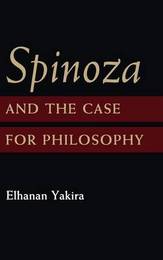
|
Spinoza and the Case for Philosophy
Hardback
Main Details
| Title |
Spinoza and the Case for Philosophy
|
| Authors and Contributors |
By (author) Elhanan Yakira
|
| Physical Properties |
| Format:Hardback | | Pages:298 | | Dimensions(mm): Height 235,Width 160 |
|
| Category/Genre | Western philosophy - c 1600 to c 1900 |
|---|
| ISBN/Barcode |
9781107069985
|
| Classifications | Dewey:199.492 |
|---|
| Audience | | Professional & Vocational | | Tertiary Education (US: College) | |
|---|
| Illustrations |
1 Halftones, unspecified
|
|
Publishing Details |
| Publisher |
Cambridge University Press
|
| Imprint |
Cambridge University Press
|
| Publication Date |
8 December 2014 |
| Publication Country |
United Kingdom
|
Description
This book analyzes three often-debated questions of Spinoza's legacy: was Spinoza a religious thinker? How should we understand Spinoza's mind-body doctrine? What meaning can be given to Spinoza's notions - such as salvation, beatitude, and freedom - which are seemingly incompatible with his determinism, his secularism, and his critique of religion. Through a close reading of often-overlooked sections from Spinoza's Ethics, Elhanan Yakira argues that these seemingly conflicting elements are indeed compatible, despite Spinoza's iconoclastic meanings. Yakira argues that Ethics is an attempt at providing a purely philosophical - as opposed to theological - foundation for the theory of value and normativity.
Author Biography
Elhanan Yakira is Schulman Professor of Philosophy at the Hebrew University of Jerusalem. He has previously taught at the Sorbonne, Ecole Normale Superieure in Paris, Ecole des Hautes Etudes en Sciences Sociales, Pennsylvania State University and Indiana University. Yakira's previous publications include Necessite, Contrainte et Choix: la metaphysique de la liberte chez Spinoza et Leibniz (1989), winner of the 1990 Charles Lambert Prize from Academie des Sciences Morales et Politiques, Institut de France; La causalite de Galilee a Kant (1994); Leibniz's Theory of the Rational (with Emily Grosholz, 1998); and Post-Zionism, Post-Holocaust (Cambridge, 2010).
|